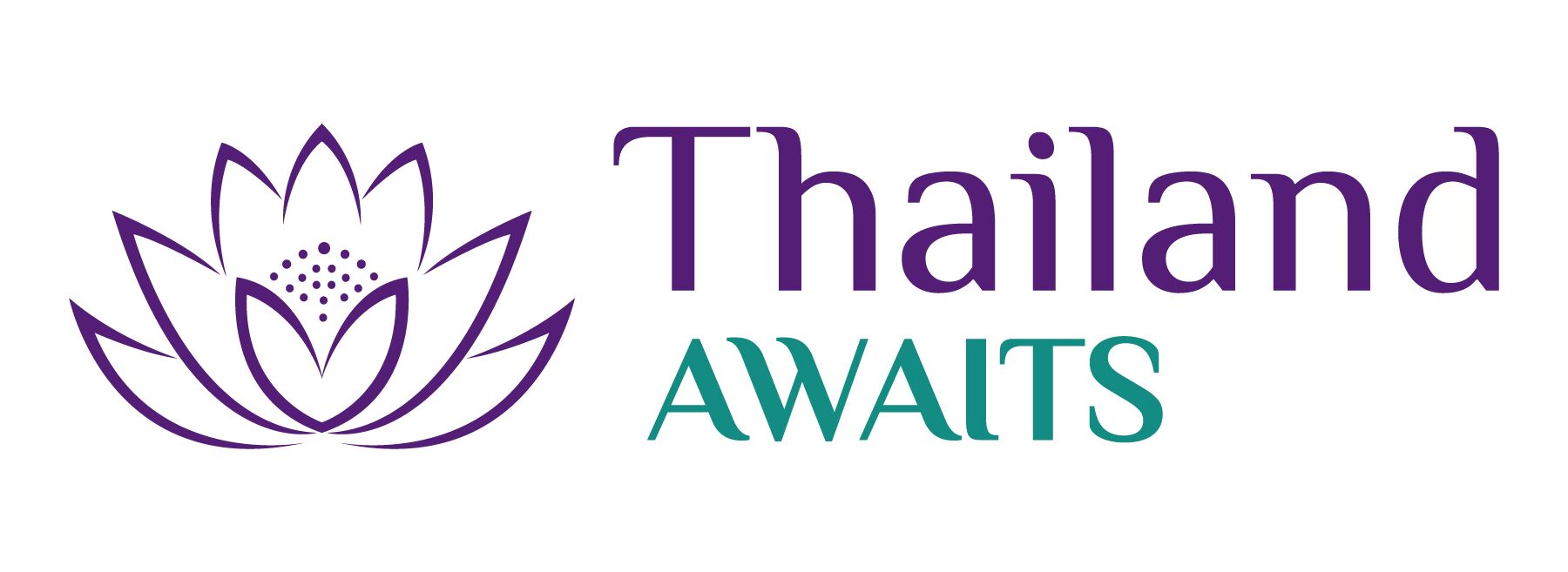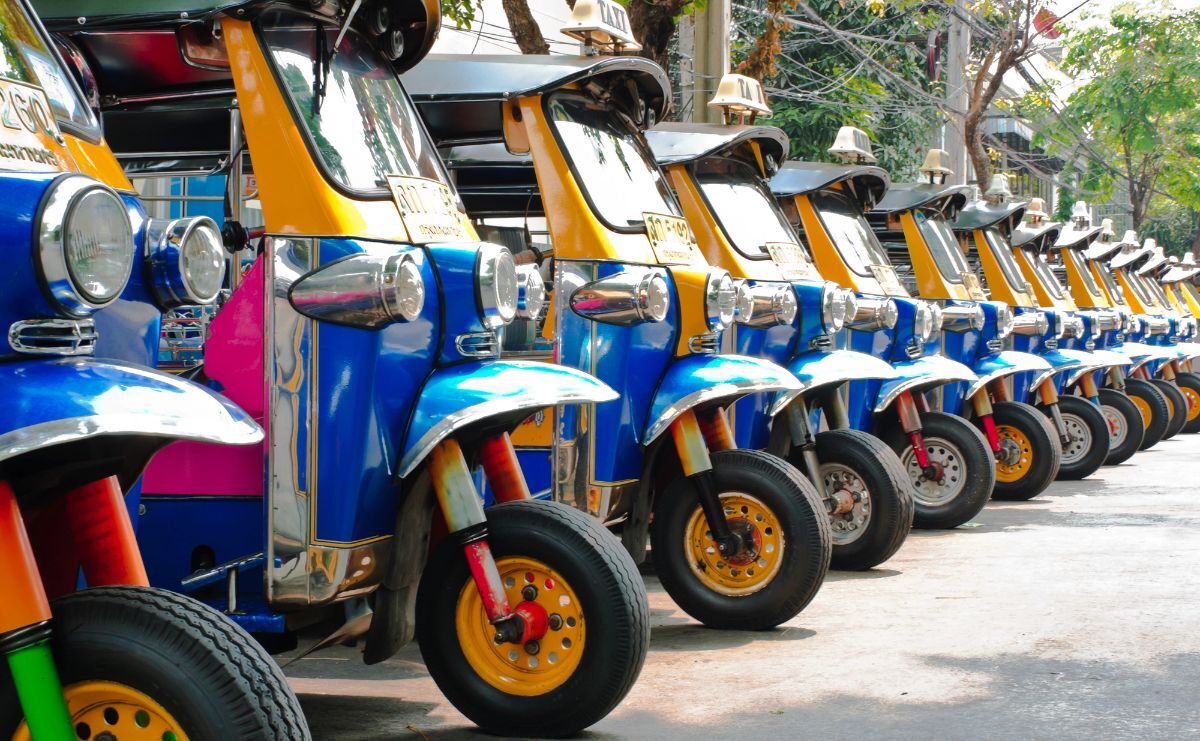Being keenly aware of the common scams in Bangkok can help you safeguard your travel experience in this vibrant city. Regrettably, not every encounter is well-meaning. Like in any big city, some people seek to take advantage of unwary tourists. Knowledge is power, so below Bangkok local Stephen shares a few of the most common scams you may encounter because knowing of them before you travel can make a world of difference to your visit.
This page contains affiliate links. Please see our disclosure policy for more details.
Are you worried about scams in Bangkok? Around the world, tourists get scammed in some of the most well-known destinations. In Rome, for example, handsome muscle guys approach visitors to the Coliseum in gladiator uniforms and ask if they’d like a photo together. Only to be charged an exorbitant amount afterwards. Or the kind hippie outside a department store in Los Angeles who hands you a free smiley badge. Only to then demand a donation to their cause.
Sadly, Bangkok also has its fair share of scams; I’ve seen all the following and even been caught by a few. So please, learn from my mistakes, and watch out for these.
Airport Transfer Scam
If you’ve paid for a transfer from the airport to your hotel, you expect to meet a driver holding up a board with your name on it as soon as you exit from customs. Some unscrupulous drivers will walk around reading the name plaques, then using chalk or whiteboard, copy your names onto them and stand even closer to the exit, ensuring you see them first, before your official driver.
Along the way, they may take you to a friend or family’s shop or request additional payment for tolls or airport parking (which should already have been covered in the pre-paid transfer cost).
How to Avoid the Airport Transfer Scam
With stricter security at the airport, this scam has thankfully become less common. If you see your names written by hand, keep walking until you find ones printed on hotel stationery. This is more likely to be the correct one.
Taxi Scams in Bangkok
Bangkok is well-known for having unscrupulous taxi drivers. During the Covid pandemic, taxi drivers were grateful for any fare, and the industry improved dramatically. Sadly with rideshare companies like Grab and Bolt picking up many of their customers, they’re back to resorting to their poor tactics again. Here are the current ones…
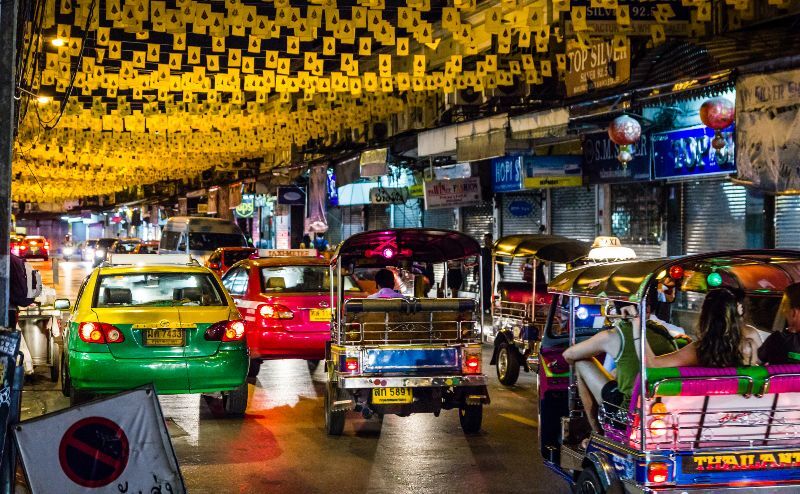
The No Meter Scam
Meter taxis have a fixed fare structure. It’s 35 baht to get in, then 5 baht per km, if the traffic slows to less than 2km/hour waiting time of 75 baht per hour kicks in. When you do the math, it’s some of the lowest prices you’ll ever find. Let’s do an example, a 15km ride would be 35 + 15*5 + let’s say waiting time of 20 minutes (25 baht) so the total is 135 baht. That’s reasonable.
Some taxi drivers will adopt a ‘no-meter’ policy and give you a fixed price to get to your destination. This usually starts around 300 baht and can be upwards of 1,000 baht. Considering that 1,000 baht should get you 200 km away, that’s outright extortion.
How to Avoid the No Meter Scam
Simply say no. Ask them to switch on the meter or get out of the taxi. Even if you have to deal with three or four in a row, eventually, you’ll get one who’s more than happy to switch on the meter.
If you don’t get lucky, and every taxi driver says this, it may mean your destination is challenging to get to, or it’s a known traffic jam spot, and if you must get there, you may have no choice but to pay the amount, I’ve done it, and for convenience’s sake, it’s been worth it. I’ve never paid 1,000 for a one-way trip in downtown Bangkok, though.
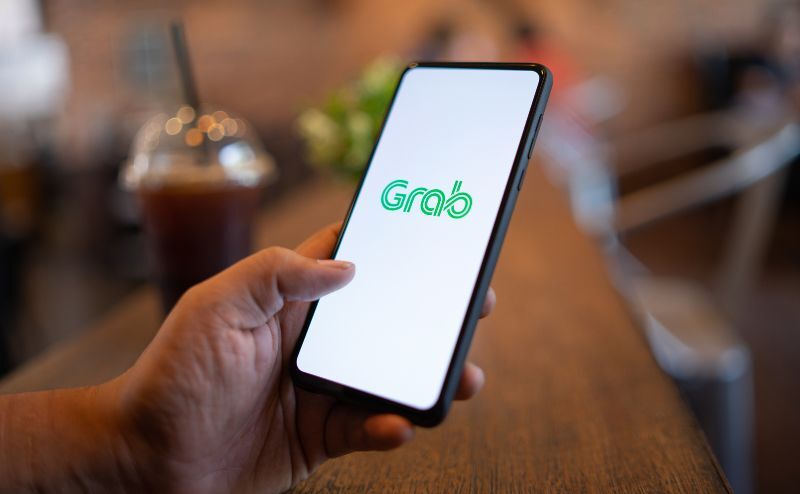
The Roll Down the Window Scam
You flag down a taxi and try the door, but it’s locked. The driver rolls down the window to ask where you’re going. You tell him, and he then decides whether he’ll take you. If it’s inconvenient for him or he just doesn’t want to go, he’ll say no, roll up the window and drive away.
How to Avoid the Roll Down the Window Scam
Go to a registered taxi stand at a shopping mall or hotel. If a taxi waits for passengers there, they accept that they’ll go wherever the passenger wants. Alternatively, if the cab hasn’t locked the doors, do what my friend does. With loads of confidence, he just gets into the back seat and tells them the destination. He doesn’t give them a chance to say no. It doesn’t always work; some drivers will absolutely refuse to go and tell him to get out.
Bangkok Tuk-Tuk Scams
Tuk-tuks are one of my favourite modes of transport in Bangkok. For short-distance trips with no more than three people, they can be fun, and these guys know how to get around traffic jams. I’ve met many awesome drivers, and I’ll always be a fan. But there are a few dodgy ones out there, and they’ll try the following…
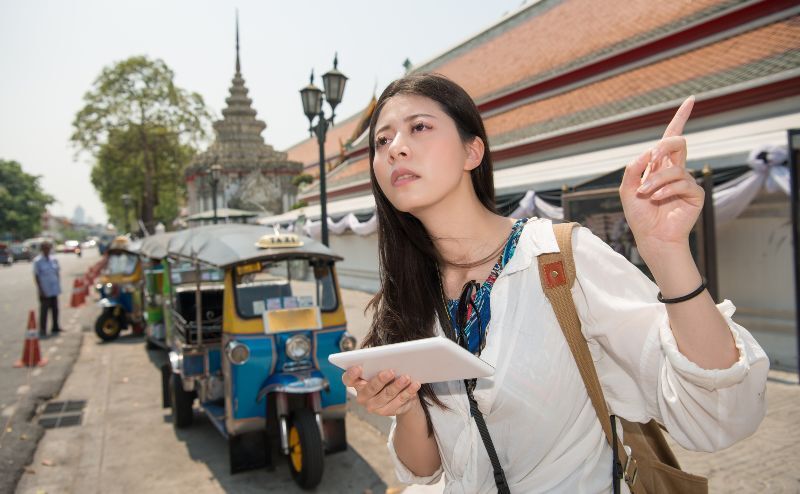
The Temple is Closed Scam
This scam has been running for years; it’s so well-known worldwide that even the US Embassy has a warning on its site. It’s very simple. The tuk-tuk driver has a friend dressed in temple clothes standing outside the entrance to famous temples like The Grand Palace or Wat Pho. As you approach the entrance, this person politely tells you that the temple is closed today for whatever reason.
They then introduce you to a tuk-tuk driver, who can conveniently take you to ‘one that is open’ for a very low price, around 50 baht.
The catch is that they’ll take you to their friend’s shop that sells jewellery or something else of high value and refuse to take you anywhere until you buy something. I even know of one couple where the store staff locked the doors until they bought something.
How to Avoid the Temple is Closed Scam
The Grand Palace is closed very, very rarely. If it is, it’ll be for a royal event so grand that it will be advertised months in advance. To be doubly sure, check the schedule page of the Grand Palace site.
The City Tour Scam
Another Tuk-Tuk scam is where a driver offers a city tour at an incredibly low price. However, the tour usually includes several stops at shops where the driver receives a commission for any purchases you make. The driver may also take you to a restaurant or bar where you’re overcharged.
How to Avoid the City Tour Scam
Never, and I mean never, get in a tuk-tuk who offers to take you on a temple tour without asking first if there is a stop at shops or restaurants. There are legitimate tuk-tuk tours that you can book via your hotel or respectable sites like Get Your Guide or Klook that avoid this behaviour.
Tip: There is a new Tuk Tuk service in Bangkok called MuvMi. MuvMi are electric tuk tuks that operate on a ride share system. Download the app and book a Tuk Tuk for your next outing.
MuvMi are clean, quiet and seat up to eight. They offer their services in many popular parts of the city, however they do not cover Chinatown or Bangrak. Check their website for the current map of areas they service.
The Tourist Price Scam
This scam happens more in the islands like Phuket of Koh Samui, but it’s popped up a few times in Bangkok, so it’s best to be aware of it. Some restaurants have two menus: the local one and the ‘Farang’ (foreigner) one. The dishes are the same; however, the prices on the Farang menu are highly inflated.
How to Avoid the Tourist Price Scam
In some cases, there’s no avoiding it, especially if you’re on your own. My tip is to go with a local and have them ask for the local menu. If you feel brave, you could ask for the local menu and use one of the many translation apps to help you know what you’re ordering.
Other Ways to Avoid Being Scammed
Using reliable and official services can also help tourists avoid scams. This includes using official taxis or public transportation instead of unlicensed cabs, booking tours or activities through reputable companies, and avoiding unofficial or unlicensed vendors.
Tourists should also be wary of too-good-to-be-true deals. Scammers often lure victims in with promises of cheap prices or exclusive offers. If a deal seems too good to be true, it probably is.
It’s always a good idea to do some research or ask for a second opinion before committing to anything. The internet is your friend here. Like with the Temple is Closed scam, it only takes a few seconds to open the official site on your smartphone and check the operating hours page.
Tourists should also be cautious when handling money. This includes counting change carefully, using secure payment methods, and being wary of anyone who asks for upfront payment or deposits.
When I first got here, it took me a while to get used to the money and especially at night, after a few drinks, I’d hand over 500 baht instead of 50 baht, and a dodgy cashier would take it as full payment and pocket the change. Keeping valuables secure and out of sight is also a good idea to avoid attracting attention.
We don’t intend to frighten you, as scams in Bangkok are rare and not the norm. The majority of tourists have a wonderful, scam-free visit. This guide aims to arm you with the knowledge to prevent scams and ensure a smooth stay.
If the worst happens and you do get caught in a scam, depending on the severity, you can contact the tourist police or your local embassy.
Don’t let the potential pitfalls hold you back. Bangkok is a city with a vibrant street life, rich cultural heritage, and mouthwatering food. Remember, Thai people are generally warm and welcoming, and probably just as eager to make your journey safe and memorable as you are.
Here’s to your unforgettable adventure in the City of Angels. Safe travels!
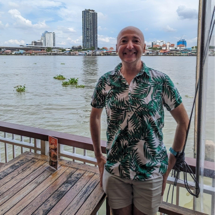
About the author: Stephen left Australia in 2016 with a one-way ticket to Thailand
and hasn’t been back since. Seven years later, he’s “living the ex-pat dream”, married and settled down; he and his partner travel across Thailand competing in half-marathon running events and sampling coffee at cafes.
